The main sections in this Newsletter are as follows:
Who are the Local Area Co-ordinators for Older People?
What do we do?
What is Social Support?
Who do we work with?
What have customers and carers told us?
Our Consultation Survey
What can we do differently?
Working in partnership with Community Groups
What difference has the Local Area Co-ordination Team made for individuals?
How can attending local community resources make a difference in an older person’s life?
Useful Websites
Who are the Local Area Co-ordinators for Older People?
East Dunbartonshire Health and Social Care Partnership (HSCP) has a team of Local Area Co-ordinators specifically employed to work with older people. There is one full time Co-ordinator and two part-time Coordinators. The team has been in place since March 2019.
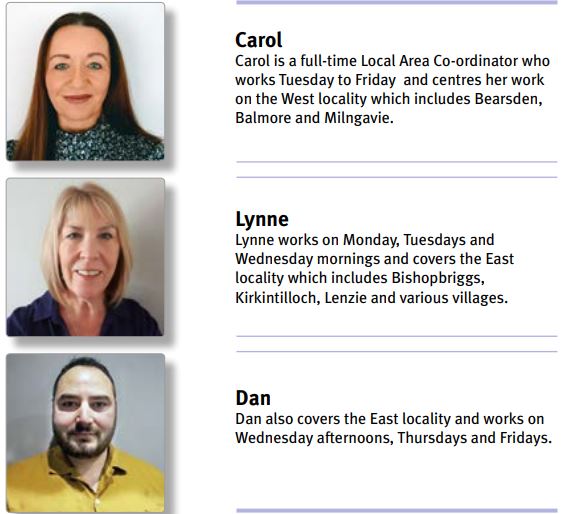
What do we do?
The team have a strong understanding of the challenges faced by older people and their carers. They are committed to enhancing the lives of older people and support capacity building at an individual, family and community level. Local area co-ordinators identify, connect, develop and lead strong partnership working with local communities, fostering links with voluntary organisations, statutory agencies and other stakeholders to improve connections and develop pathways within local communities. They will support the older person to identify issues that affect their ability to live well and will work with the individual to help them access community assets and services that would best meet their needs.
Members of the team will work with individuals to help identify suitable local resources and assets and connect the older person to their community. They work closely with local communities groups and third sector organisations.
What is Social Support?
Social Support can mean different things to different people. People have different types of circles of support, for example; family, friends, faith connections, community clubs and groups, but everyone benefits from some kind of social support in their lives. It provides opportunities to have others to turn to in times of need or crisis. Social support can enhance a person’s quality of life having a positive benefit impact on their physical health and mental wellbeing. It can also be about shared interests, strengthening your own and others skills, sharing those skills with others, providing mentoring and teaching opportunities to others, and opportunities to learn new skills.
Social support for people without significant formal care needs can be delivered in the community by connecting individuals to local clubs and groups that are organised and run by volunteers.
For those individuals who are unable to attend a local club or groups, even with volunteer support, because of the type of support they require (for example personal care) the HSCP will undertake an assessment of need. This will determine whether the older person is eligible for formal social support,for example, delivered in a formal day centre with access to social care staff who can provide personal care support.
Who do we work with?
The team work with a variety of people across the authority. These can include,third sector organisations,places of faith, and community centres. However a significant portion of their working week is focused on helping individuals explore local community social support opportunities or assessing older people for formal support. This can also involve working in partnership with families and unpaid carers. In 2022-2023 the team received 274 referrals. The referrals were a mixture of requests to assess individuals for formal support, whilst others focused on asking the team to help older people connect with their local communities.
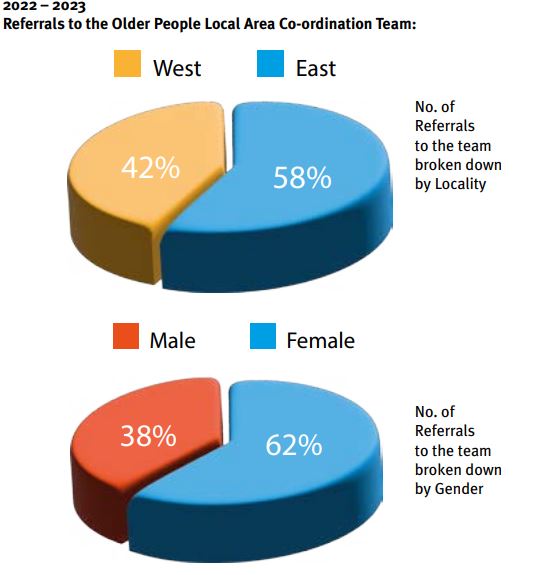
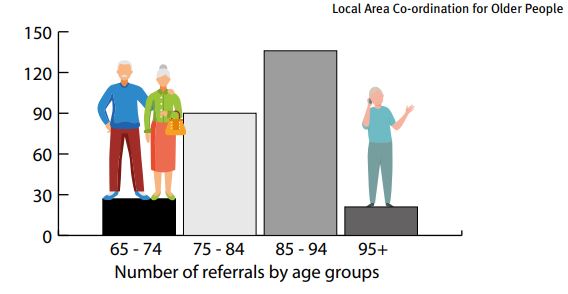
The team also work in partnership with unpaid carers, supporting carers to identify their own needs and outcomes. The Carers (Scotland) Act 2016 extends and enhances the rights of carers in Scotland to help improve their health and wellbeing, so that they can continue to care, if they so wish, and have a life alongside caring. One of the legislative duties within the Act is that HSCP’s should ensure that unpaid carers’ needs and outcomes are recorded in an Adult Carer Support Plan, where this is the wish of the carer.
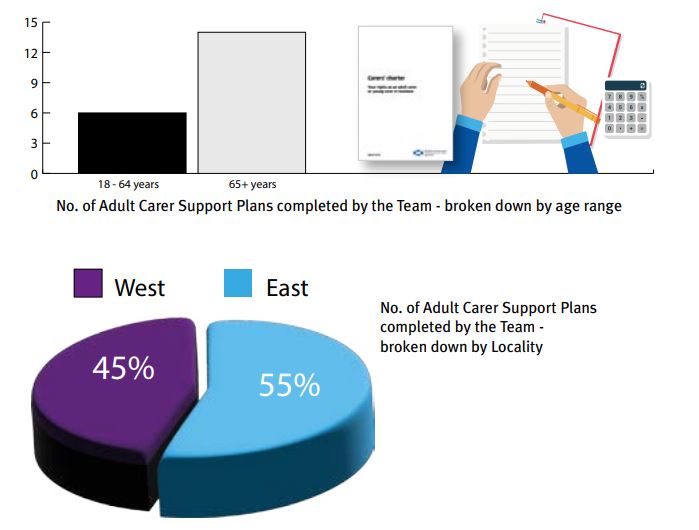
What have customers and carers told us?
During 2022/2023 the team have received a number of comments from customers and carers about the work they have undertaken with individual older people. This work included assessing and support planning with customers who were eligible for formal social support, and introducing other customers to local clubs and groups.
- “Massive thank you for arranging day centre support for my dad”
- “...really appreciate your follow up, consideration and guidance...”
- “Thank you so much for your help...it’s the first time I knew someone understood”
- “... grateful for your kindness and the information you shared with us regarding opportunities for dad...for some lovely socialisation in the area”
- “...you have been a great help...”
- “...grateful for your caring and professional attitude...”
- “What a difference in mum after just speaking to you”
- “...really appreciate your help and advice... we are going to go along to one of the groups...”
- “You’ve helped us so much to get (the group) started”
Our Consultation Survey
The team undertook a consultation survey for all the customers throughout 2020-2021 that had been signposted to local community groups and clubs. The feedback was much lower than expected and did not provide us with reportable analysis. However, we recognised that the response was impacted by the extended closure of local clubs and groups during the pandemic period.
It is our intention to undertake a consultation survey every two years, with customers and their carers, to help us understand the impact that attending community resources has for older people. The next survey will take place in the summer of 2023.
What we have learned?
Over the last year (2022 – 2023) the service has seen an increased number of referrals for older people who have been significantly impacted by the pandemic. Referrals were received from many families concerned that their older relative, who had been active in the local community by attending groups, visiting friends etc, were no longer able to undertake this independently due to having been unable to participate for nearly two years. This is evidenced in the number of referrals that the service has received over the last few years.
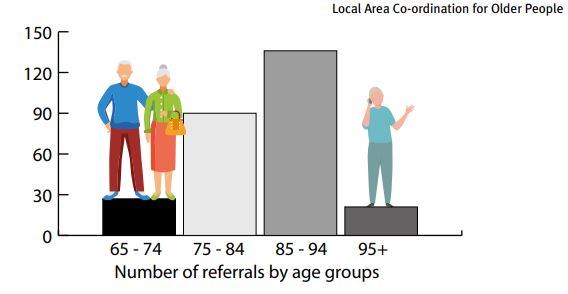
We have learned from our experience over the last few years the importance of helping older people to establish links with their local community at an earlier stage in the ageing journey. We recognise that socialisation and interacting with peers can have a positive impact on both physical health and mental wellbeing.
There are lots of ways that people can improve their social support opportunities and there are various organisations that can provide information and advice.
However, there are ways that individuals can improve their own social support opportunities such as:
- Explore the use of technology
- Follow your interests
- Be pro-active, seek out people or groups
- Get together a group of like-minded people with similar interests
- Improve your own strengths and skills
What can we do differently?
The HSCP carried out a consultation survey from July to October 2021 to explore what older people, their families and other stakeholders felt we should concentrate on in respect of meeting older people’s social support opportunities.
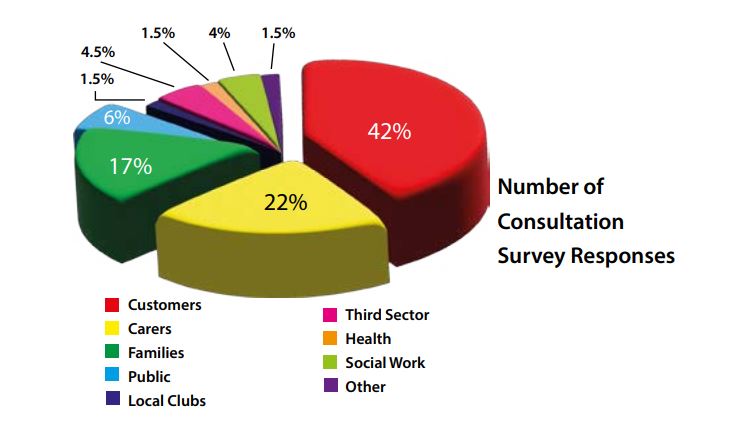
The responses advised us that the two main priorities the HSCP should focus on in the future were:
- Supporting older people to access local clubs and community groups
- Providing centred based support which focuses on supporting older people who are most vulnerable and at risk.
In April 2023 a five-year Social Support Strategy for Older People (2023 – 2028) was approved by the HSCP’s Integrated Joint Board. The HSCP are currently working in partnership with day centre providers and local third sector organisations to bring the priorities to fruition. A copy of the Strategy is available on the Council website.
What difference has the Local Area Co-ordination for Older People made?
Over the year (2022-2023) the team have received referrals for older people who wanted to reconnect with their communities. We helped 63 older people to access local community assets either by providing information, signposting, making a referral or introducing the individual to different clubs.
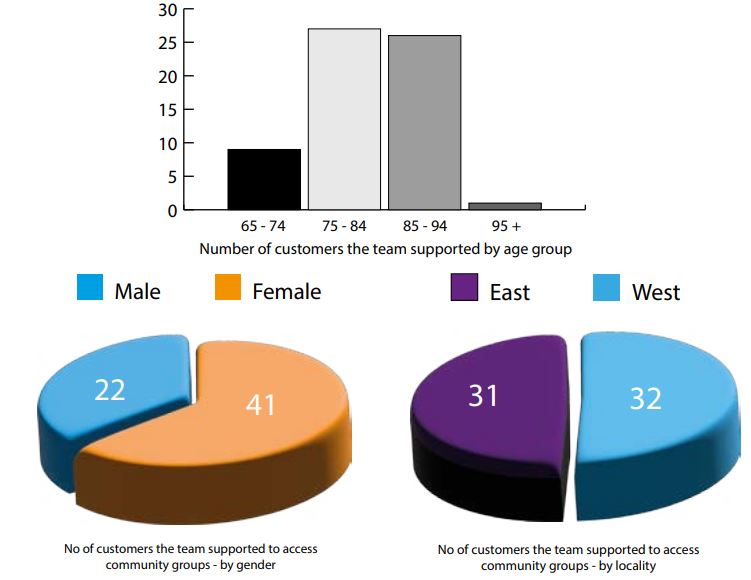
Working in partnership with Community Groups
Apna Ghar
A new group was set up within the Bearsden area for women from the Black, Asian and Minority Ethnic (BAME) communities. The group offers a friendly, welcoming environment for women from various cultural and religious backgrounds encouraging friendship and peer support.
The Local Area Co-ordinator worked in partnership with the volunteers and organiser for the group, East Dunbartonshire Voluntary Action (EDVA), the public and the Council to establish the group, secure accommodation, in developing the group’s constitution and membership, and supporting funding applications.
The group now operates independently with minimal assistance from the Local Area Coordination Team. We keep in touch via email and telephone to ensure that the group continues to be supported in respect of funding opportunities and increasing membership.
The group supports large numbers of older people and also has access to volunteer drivers who assist with escorting people to and from the venue.
A Bite and a Blether
This is a new group that was set up by Ceartas Advocacy Service in partnership with the team and other third sector colleagues. The group invites anyone experiencing loneliness and isolation. Lunch, drinks and treats are provided alongside social chat, peer support and making friends. Due to the charity funding that the group receives they are currently able to run free of charge, for those who are attending.
There are two Bite and a Blethers happening in East Dunbartonshire, one in the East and the other in the West locality. They are very well attended and whilst they are both at full capacity, they operate a waiting list for new referrals.
The Local Area Co-ordinating team encourage older people to go along and try the group, helping to maintain individual’s independence. We also have close links with the Community Response Team who provide transport support to individuals who are unable to utilise local transport or if the person needs to boost their confidence to socialise outdoors.
The Monday Club
The Monday Club has been running for a number of years in one of the local Churches in Bearsden. The group offers social support and company for older people. The group is ran by volunteers from various Churches and they often have guest speakers and entertainment for their members who can also enjoy home baking and refreshments. The team maintain close links with the Club’s organiser ensuring support to apply for grant funding and reinvigorating membership numbers.
New Roots Gardening Club
A new group has been established in Twechar which offers older people the opportunity to participate in gardening activities as well as social support with others who share their interest.
The group is based at the Healthy Living Centre and runs both a morning and afternoon session every Tuesday. Anyone wishing to stay for both sessions is more than welcome. This is a particularly beneficial group for older people who have perhaps moved from a different area or downsized and no longer have access to a garden.
The team have been working to signpost individuals to this group because it can offer, as well as gardening, motivation, company and inclusion.
Young at Heart
The Young at Heart group is a friendly, informal group that meets every Wednesday, and is based in the Kirkintilloch Miners Club. It has been running for over four years and is organised by a local couple who are retired publicans. Members can enjoy music from different eras, dancing, chat, peer support and afternoon tea. For a small donation a game of bingo and a raffle also takes place.
The team have supported individuals, including those with early dementia diagnosis, and their carers to attend the group. We ensure that the group organisers are kept up to date with funding opportunities, signposting them to work with EDVA.
Health Walk for All
A member of the team has been attending the Health Walk run by the Recovery Aftercare Community Enterprise (GRACE) building up relationships and meeting older people who attend as part of that group. The Local Area Co-ordinator has been able to signpost some of the older people to other local community assets and has been informed about some groups that we were able to add to the Community Assets Map.
The Health Walk aims to tackle loneliness through meaningful connections and conversations. The groups adopt a moderate walking pace on a Monday at 1.30pm and there is a slow walking pace held every Thursday at 10.30am. Group members often head to the café afterwards for a friendly chat.
The Local Area Co-ordination Team for Older People maintain very close links and positive relationships with the groups and clubs featured in the annual newsletter. Joint working is key to supporting a thriving social support network for older people in East Dunbartonshire. All of these and other community assets can be found on the East Dunbartonshire Community Asset Map
What difference has the Local Area Co-ordination Team made for individuals?
Helping older people to access local community resources
Mrs A is a 87 year old lady who lives alone and was referred to the team because her family felt that she was socially isolated and suffering from a low mood. Previously Mrs A was a very active lady who enjoyed activities including golf, yoga, bowls and she liked to travel. As a result of medical conditions she no longer has the ability to attend any activities or access her community without support. This significant change in one’s life and abilities can be difficult to accept for many people. Following a visit from the team, it was evident that Mrs A was not yet at the stage that she required to attend a formal support service and the Local Area Coordinator was keen to encourage her to try out some of the community assets in her local area. Mrs A was provided with details of Contact Point, a social group that meets in the Park Centre in Kirkintilloch, as well as a referral to OPAL to access volunteer support for shopping. Mrs A was delighted having been unaware of these local resources.
Mr E is a 90-year-old gentleman living alone at home. He was referred to the team to consider eligibility for social support opportunities. However, the assessment confirmed that Mr E was self-caring and managing at home independently. This meant that Mr E was not eligible to access any formal social support opportunities however he was an ideal candidate to enjoy the local community assets.
Mr E had been a very active man enjoying various social activities, however after being widowed in recent years, he was now finding himself lonely and isolated at home. He had also lost confidence when travelling outdoors due to being unsteady on his feet.
With assistance from the Local Area Co-ordinator Mr E is now enjoying the company and peer support offered by the Milngavie and Bearsden Men’s Shed. Mr E had taken it upon himself to find out more about the Shed and contacted the co-ordinator directly. He was struggling to attend the group independently and the Local Area Co-ordinator arranged a referral to the local Community Response Team who support him with transport to and from the Shed.
Mr E has now also started attending the Bite and Blether Group, enjoying lunch and social chat with other older people. He organises a taxi to attend the venue and is assisted home by one of the group members. Mr E has reported that he thoroughly enjoys attending the groups, advising that they each offer different experiences. He is delighted at the opportunity to expand his circle of friends and having the social company whilst also remaining independent in his local community.
Assessing and arranging formal social support for older people
Mr M is a 77 year old gentleman who is living at home with his wife. Mr M has been diagnosed with dementia but is reasonably mobile and able-bodied. Mr M requires supervision with everyday tasks including personal and practical support and if not provided with supervision, he can become disorientated which can result in him leaving the house alone. Mr M was assessed using the HSCP’s Eligibility Criteria policy for day care/social support meeting the critical or substantial levels for formal support. However, Mr M was not keen on attending the local Day Centre where the team, and his wife, felt that he would most benefit from formal supervision and support available whilst having an opportunity to enjoy social company.
The Local Area Co-ordinator offered to drive and escort Mr M to the Centre for a short visit. When Mr M arrived at the Centre, he soon relaxed and began chatting to his peers. Mr M now attends the Centre one day per week, enjoying the social interaction and activities it provides. Whilst Mr M attends the Centre, Mrs M has a break from her caring role with opportunity to relax with the reassurance that her husband is safe and happy. Whilst the main benefit of attending the Centre is to meet Mr M’s needs and outcomes, there is also a significant indirect benefit to his unpaid carer.
Mr G is an older gentleman living with his wife at home. He has complex health problems and a diagnosis of Alzheimer’s disease. He requires care and supervision with everyday living tasks to keep him safe from harm. Mr G was assessed using the HSCP Eligibility Criteria Policy for day care/social support meeting the critical or substantial levels for social support.
Mr G was reluctant to accept formal social support and his wife was keen that he try the local Day Centre. Mr G reluctantly agreed to have a trial visit and since then he has continued to attend.
Mrs G now reports that her husband is thriving at the Centre with staff reporting that he gets on well with the team as well as mixing with his peers and enjoying the activities on offer. Mrs G is relieved that her husband appears to have settled and says that he is a different person whilst he is attending the support service. Mrs G enjoys the time to herself whilst Mr G is at the Centre, giving her a break from her caring role, and time to enjoy her own hobbies and interests. Mrs G feels that the day centre support has made a positive difference to both their lives.
How can attending local community resources make a difference in an older person’s life?
Meet Mrs M!
Mrs M, is a delightful and chatty lady, who is almost 94 years old. She lives alone within a sheltered housing complex in the West locality of East Dunbartonshire. Mrs M is independent in personal and practical daily living activities.
When Mrs M moved to the complex approximately 20 years ago she started attending the local groups and clubs.
Mrs M told the team that she didn’t have a life plan, and that she never knows what she will do on a daily basis.
She gets up every morning wondering what she will get up to, she doesn’t like to miss out any activities. Laughing and joking with the team member, she tells us that she is “nosey” and doesn’t like to think she is missing out.
Mrs M attends line dancing in Clydebank and Maryhill which is out with her local community. She uses the public transport network to attend these activities. She also attends coffee mornings and social events in her sheltered housing complex. In addition, Mrs M also uses transport to travel to the local churches and halls participating in a variety of clubs and groups. She jokes that she is not home much and likes to keep busy.
Mrs M recalled the time that she had once got lost in China when she was on her travels. She had holidayed with an organised group arranged by the travel company. She got separated from the group and was able to navigate her way back to the hotel by chatting with locals and not being afraid to ask for help. She confirmed that she is not shy and that she can make friends anywhere.
The team asked Mrs M what advice she would give to other older people and the younger generation in relation to living a fulfilled life, she suggested:
- "Do not take life too seriously"
- Dont worry about situations and things that you cannot control"
- "Be nosey"
- "Join in and chat with everyone you come into contact with"
- "Learn from others"
- "Keep active and healthy"
The team agree that Mrs M has really shown the positive impact that keeping active and connected can have on an older person's life.
Useful Websites
East Dunbartonshire Community Assets Map
Carers Link
East Dunbartonshire Voluntary Action
East Dunbartonshire Befriending Service
East Dunbartonshire Citizens Advice Bureau
Age Concern
Scottish Older People’s Assembly
Kirkintilloch Men’s Shed
Milngavie and Bearsden Men’s Shed
East Dunbartonshire Initiative for Creative Therapy
